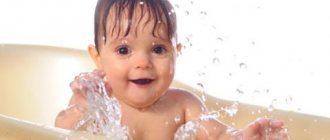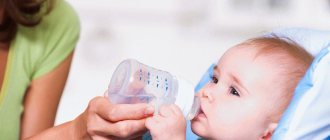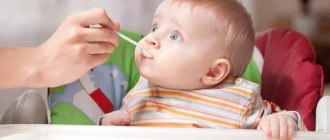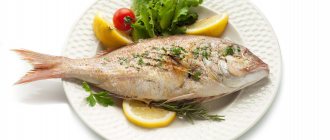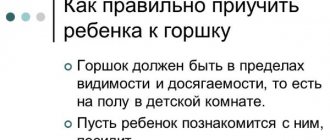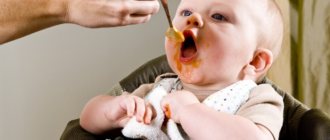Why is proper drinking regime important for children? How and when to feed a baby and how does water for babies differ from regular drinking water?
Water is involved in almost all vital processes of the human body, so pediatricians note the importance of maintaining a drinking regime in children in the first months of life, because the metabolic rate of babies is very high and moisture loss is also significant.
“Water is necessary for the processes of digestion and absorption of food, the functioning of the circulatory system, regulation of body temperature, and the removal of metabolic products, including harmful ones. In addition, water serves as a source of fluoride, calcium and other mineral elements for the body,” notes Ekaterina Pyryeva, Candidate of Medical Sciences, head of the Laboratory of Age-Related Nutrition at the Federal State Budgetary Institution of Education “Federal Research Center for Nutrition and Biotechnology.”
Photo by Lennart Schneider on Unsplash
Dehydration of the body can lead to disruption of the kidneys and digestive organs, increasing susceptibility to infections and allergic reactions. If you notice these signs in your child, it’s time to offer him something to drink. It is also recommended to give more water if the baby has a high fever, colic or constipation.
The main signs of baby dehydration:
- restless behavior
- increased tearfulness and lack of tears
- rare eye blinking
- pale and dry skin, lips and mouth
- rare urination (the norm is about 20 times a day)
- dark color and strong odor of urine
- flaccid state and retraction of the fontanel
A lack of water in a baby’s body can also occur as a result of overheating - as body temperature rises, sweating also increases. This is especially true in the summer, when the house can be very hot, or in the winter, when indoor radiators are working at full capacity.
“In the room where the child spends most of his time, the air temperature should be no higher than 25 degrees. It is important to take care of your baby’s clothes; they should not be excessive. Overheating will lead to an increase in body temperature, poor health of the child, and excessive loss of fluid,” adds Ekaterina Pyryeva.
It is recommended to ventilate the room more often - fresh air will only be beneficial. And remember that the humidity in the room with the child should be at least 50-70%. Dry air leads to increased breathing, decreased protective functions of the body, difficulty swallowing and colic.
The role of water in a child's life
Water carries life, and, accordingly, the role of this liquid in people’s lives is not exaggerated:
- Voditsa actively participates in every metabolic process occurring in the body.
- Regulates body temperature.
- Delivers nutrients and minerals dissolved in it to cells and tissues.
- Metabolic products are removed from the body with excess fluid.
- In addition, it is a source of all necessary mineral salts and fluorine.
A person consists of approximately 80% water, which is why water is so necessary for the full development of a child’s body.
Why is water not recommended for newborns?
Experts believe that you should not give water to newborns for several reasons:
- Water affects nutrient absorption. Excess water affects the ability to absorb nutrients from breast milk or formula. Decreased absorption leads to weight loss and increased bilirubin levels.
- Water intoxication. Too much causes water intoxication, thereby diluting the nutrients in the body. This will lead to cramps and a decrease in body temperature.
- Loss of minerals. According to the researchers, children under six months should not be given water because their kidneys are still not developed enough to perfectly regulate water-salt metabolism. And they remove sodium along with excess water.
- Loss of appetite. The child's stomach fills with water, leading to imaginary satiety. The baby will not want to drink breast milk or formula afterwards. This leads to a lack of required amounts of nutrients.
What kind of water can be given to a child - basic requirements for baby water
But not all water is healthy. The water that comes out of the water supply may contain various bacteria, radionuclides, heavy metals and other substances that are toxic and harmful to adults, and especially to children. She can't give small children anything to drink!
Parents have two options:
- Or install a deep cleaning filter.
- Or use bottled water for children's drinks and soups that meets all sanitary rules and regulations.
But it is not recommended to boil water, since heat treatment completely kills not only harmful microbes in it, but also beneficial microelements.
According to SanPiN 2.1.4.1116-02, baby water must be enriched:
- Potassium (up to 0.02 g/l).
- Calcium (up to 0.08 g/l).
- Iodide ion (up to 0.06 mg/l).
- Fluoride ion (up to 0.7 mg/l).
- Magnesium (up to 0.05 mg/l).
- But there should be no silver
Total mineral substances in water for children should contain no less than 250 and no more than 500 mg/l. Such water should be no harder than 7 mEq/l, with an alkali content of no more than 5 mEq/l.
The name of the water on the label must necessarily contain the word “children’s” or “for children”, and it must comply with the requirements of the legislation of the Russian Federation.
The manufacturer must also have the following documents:
- Certificate of state registration of Rospotrebnadzor.
- Certificate of conformity of the brand for water.
- Declaration of conformity of the brand for water.
- Declaration confirming the product’s compliance with the requirements of the Customs Union prescribed in the technical regulations.
There are two types of baby water on sale:
- Drinking water.
- Water for preparing baby formula.
Preparing artificial nutrition for a baby using drinking water is not recommended, due to the content of minerals and trace elements in the liquid that can upset the balance of the mixture.
It is advisable to give children only bottled water that is extracted from deep artesian wells in ecologically clean areas, and which is additionally passed through a filter.
To avoid accidentally purchasing low-quality water, carefully read the information on the label in small print. It should also indicate the age at which you can drink this water and its shelf life.
How and when can you start giving water to your baby?
When breastfed , babies do not need additional fluid until they are six months old. All necessary liquid, vitamins and microelements enter the child's body with mother's milk.
If a newborn eats exclusively artificial formulas , then you can start giving him a little water from the second month of life. At first, 30 ml per day will be enough for the baby.
To give your baby something to drink, you can use:
- A spoon.
- Syringe without a needle.
- A sippy cup (for children over 5 months).
- A bottle.
Small children definitely need extra fluid if:
- It is very hot outside or in the apartment.
- The baby experiences increased sweating.
- The child has a cold, the temperature has risen (especially when he refuses milk).
- Symptoms of diarrhea or jaundice appear.
Never force healthy children to drink! If the baby refuses to drink, it means there is enough water in his body.
Reasons for drinking too much water
May be psychological:
- The child is used to walking around with a bottle and constantly drinking; if it is taken away, he begins to cry and ask for the drink back. In this case, it is enough to wean your baby from carrying a bottle with you (for example, do not fill it, but let him drink from a glass) and the problem will be solved.
- Children, especially those weaned early, feel the need to suck. If parents do not provide a pacifier, the baby tries to “catch up” by using a bottle.
- Lack of parental attention can also provoke the baby to drink more liquid. This may explain why the child drinks a lot of water at night: the baby simply does not want to let mom and dad leave him, so he asks for a drink. It’s good to replace drinking with socializing - for example, reading a bedtime story.
- Often he simply does not want to go to sleep and simply delays going to bed. But since children need sleep, you need to come up with rituals that make bedtime easier.
- Stress can also provoke excessive thirst: new people in the house, kindergarten, or some other serious change in the usual way of life - the baby becomes a water drinker.
It is important to remember that the desire to drink water is normal. And if the baby drinks exclusively compotes and juices and refuses water, re-teach them: the baby likes their taste and simply enjoys it. At the same time (remember WHO recommendations) he still doesn’t get enough water.
It happens that children drink a lot of water because they are sick.
How much water should a child be given from birth - the norms in the table
You should not give breastfeeding children a lot of water, otherwise they will begin to refuse mother's milk. And milk is the main source of vitamins and beneficial microelements, without which harmonious development and growth are impossible.
Every day, infants should consume from 30 to 200 ml (no more than 20 ml per dose) depending on age. More fluid will overload the kidneys and urinary organs. With age, fluid intake gradually increases.
| Age | Consumption rate per day |
| 0 - 7 months | 200 ml |
| 7 months - 3 years | 30 ml per 1 kg of weight |
| 4 – 6 years | 70 – 80 ml per 1 kg of weight |
| 7 - 9 years | 90 – 100 ml per 1 kg of weight or 2.5 liters |
| 10 - 12 years | 3 – 3.5 liters |
| 14 – 13 years | 2.6 – 3 liters |
| 15 - 18 years old | 2.6 – 3 liters |
Formulas for newborns contain a higher amount of protein, which is why when artificially feeding a child, it is necessary to give him water from the first day of life between feedings. The volume of water consumed does not need to be added to the volume of food, but you need to give a little water if necessary.
If the baby is bottle-fed, then experts recommend giving the baby approximately 200 ml of water per day. If the child is mixed-fed, then 100 ml of water per day will be enough.
Recommendations for food and fluid balance
Here, too, everything is simple: you need to reduce the amount of fatty, overly dry and salty foods in the child’s diet, remove sweets from it (or reduce its consumption), including drinks (juices, compotes, lemonades, tea with sugar, cocoa). If your baby is already used to juices, dilute them with water. It’s better to do it right from the very beginning of complementary feeding.
Guys can be water drinkers for various reasons. And only some of them are symptoms of diseases. Everything will be fine with the baby if he is fed and watered correctly, provided with normal living conditions and - loved. Trying to get our love and attention, kids often become capricious, sometimes running to the toilet at night. So their health is in the hands of their parents.
What kind of water should I give my baby?
The best water for a newborn is bottled artesian water, enriched with beneficial microelements . It has a high degree of purification, an ideal composition of minerals and trace elements for a child’s body and does not contain gas.
But tap water should be given to newborns very carefully; it is better to completely exclude it from the diet or purchase a filter with a deep degree of purification.
The optimal temperature for baby water when taking is 25 degrees Celsius.
How to give mineral water to a child?
Experts say that mineral water directly from the source is most beneficial. True, in reality it is not easy to use this advice. The average family visits resort cities no more than 2–3 times a year. What to do the rest of the time? Buy mineral water for your child in the store.
In order for the drink to retain its properties during storage and transportation, mineral water is carbonated - saturated with carbon dioxide. Carbonation does not affect the composition and healing properties of water. Therefore, healthy children can also drink carbonated mineral water. But it is better to release the gas from the medicinal table and also heat it to the temperature it has at the source. This information can be found on the manufacturer’s website or from the doctor who prescribed the drink.
How do you know if your baby is not getting enough water?
There are some signs indicating a lack of fluid in the body.
They appear:
- In the lethargy and apathy of the baby.
- In dry mucous membranes.
- The fontanelle is sunken.
- For problems with urination (the daily norm is at least six times).
If you detect at least one of these symptoms, try to breastfeed your baby more often and give him some water each time between feedings (up to 20 ml at a time). Thanks to these manipulations, the water-salt balance in the baby’s body will be restored as soon as possible.
Where to buy and how much does it cost for children's bottled water?
Prices for children's bottled water may vary depending on the manufacturer. Water is available for sale in containers with a capacity of 0.33 to 5 liters. The average cost of a liter bottle is 40-50 rubles . You can buy it in any supermarket or grocery store, or in some pharmacies.
Water in glass containers is the healthiest, but its price is a little more expensive than its counterparts bottled in plastic bottles. If you decide to save money and buy water in a polycarbonate bottle, choose one with a triangle-shaped marking on the bottom with the number 7 inside. This plastic is environmentally friendly, safe for health and does not contain harmful impurities.
